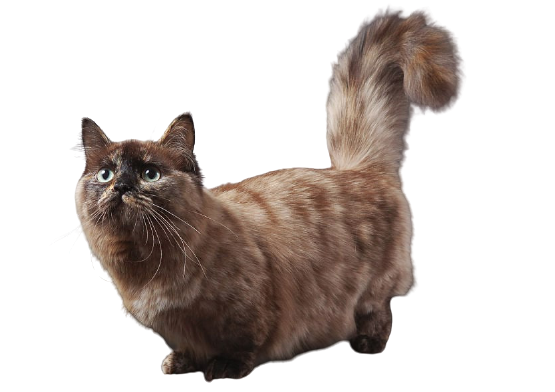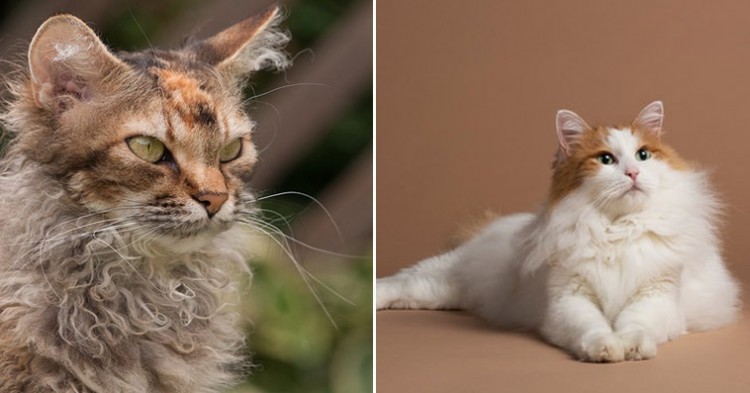
Munchkin
USD $1000 - $2000 Price Avg.
Smallest, Small
Size
Yes
Lap Cat
10 to 15 years
Lifespan
Breed Information
| Popularity/Rank | N/A |
|---|---|
| Name | Munchkin |
| Other names | None |
| Origin | United States |
| Size | Smallest, Small |
| Coat | Plush, Short, Silky, Long |
| Lap Cat | Yes |
| Lifespan | 10 to 15 years |
| Temperament |
Easy Going, Intelligent, Playful, Agile 1. Easy Going: The Munchkin cat breed is known for its easygoing and relaxed personality. These cats are often described as being "dog-like" in their behavior, and they enjoy spending time with their human companions. They are also known for being intelligent and playful, making them great pets for families with children. 2. Intelligent: The Munchkin cat breed is known for its intelligence and playfulness. These cats are often described as being "dog-like" in their behavior, and they enjoy spending time with their human companions. They are also known for being agile and athletic, making them great pets for families with active lifestyles. 3. Playful: The Munchkin cat breed is known for its playfulness and intelligence. These cats are often described as being "dog-like" in their behavior, and they enjoy spending time with their human companions. They are also known for being agile and athletic, making them great pets for families with active lifestyles. 4. Agile: The Munchkin cat breed is known for its agility and athleticism. These cats are often described as being "dog-like" in their behavior, and they enjoy spending time with their human companions. They are also known for being intelligent and playful, making them great pets for families with children |
| Weight | Female: 5 - 8 pounds, Male: 6 - 9 pounds |
| Colors | Blue, Chocolate, Cream tortie, Fawn, Lilac, Red, Seal, White |
| Kitten Prices |
USD $1000 - $2000
Munchkin kittens are a relatively new breed of cat, and as such, their price can vary significantly from breeder to breeder. Generally speaking, Munchkin kittens will cost between $1000 and $2000, although there are always exceptions to this rule. The price of a Munchkin kitten will often depend on the reputation of the breeder, as well as the quality of the kitten itself. Parents of Munchkin kittens can also have an impact on the price of their offspring. If both parents are purebred Munchkins, then the kittens will likely be more expensive than if only one parent is a Munchkin. Additionally, if the parents have any particularly desirable traits (such as blue eyes), then this can also drive up the price of the kittens. Ultimately, the price of a Munchkin kitten will be largely determined by its quality. A higher-quality kitten will fetch a higher price than a lower-quality one. However, it is important to remember that even lower-priced Munchkin kittens can make excellent pets - so don't let price be your only deciding factor when choosing a new furry friend! |
Breed Characteristics
| Adaptability | |
|---|---|
| Affection Level | |
| Child Friendly | |
| Dog Friendly | |
| Energy Level | |
| Grooming | |
| Health Issues |
Feline infectious peritonitis, Feline leukemia, Feline immunodeficiency virus, Chronic renal failure, Hypertrophic cardiomyopathy, Diabetes mellitus, Asthma Is Munchkin cat Hypoallergenic? There is no definitive answer to this question as each individual cat's fur and dander composition will differ slightly, and therefore some people may be more allergic to one Munchkin cat than another. However, in general, Munchkin cats are considered to be hypoallergenic due to their short fur coats which produce less dander than other cat breeds. If you are allergic to cats but would still like to own one, consider opting for a Munchkin cat as your best bet for a hypoallergenic feline friend. 1. Feline infectious peritonitis Feline infectious peritonitis (FIP) is a viral disease that affects cats. The disease is caused by a feline coronavirus, and it is typically fatal. Symptoms of FIP include fever, weight loss, appetite loss, and abdominal pain. There is no cure for FIP, and treatment is typically supportive. 2. Feline leukemia Feline leukemia is a viral disease that affects cats. The disease is caused by the feline leukemia virus, and it can be fatal. Symptoms of feline leukemia include fever, weight loss, appetite loss, and lethargy. There is no cure for feline leukemia, but treatment is available to help manage the symptoms. 3. Feline immunodeficiency virus Feline immunodeficiency virus (FIV) is a viral disease that affects cats. The disease is caused by the feline immunodeficiency virus, and it can be fatal. Symptoms of FIV include fever, weight loss, appetite loss, and lethargy. There is no cure for FIV, but treatment is available to help manage the symptoms. 4. Chronic renal failure Chronic renal failure is a progressive disease that affects the kidneys. The disease is typically caused by another underlying condition, such as diabetes or hypertension. Symptoms of chronic renal failure include weight loss, appetite loss, lethargy, and increased thirst and urination. There is no cure for chronic renal failure, but treatment is available to help manage the symptoms and slow the progression of the disease. 5. Hypertrophic cardiomyopathy Hypertrophic cardiomyopathy is a disease that affects the heart muscle. The disease is typically genetic, and it can be fatal. Symptoms of hypertrophic cardiomyopathy include shortness of breath, exercise intolerance, and sudden cardiac death. There is no cure for hypertrophic cardiomyopathy, but treatment is available to help manage the symptoms and reduce the risk of sudden cardiac death. 6. Diabetes mellitus Diabetes mellitus is a disease that affects the body's ability to regulate blood sugar levels. The disease is typically caused by another underlying condition, such as obesity or pancreatitis. Symptoms of diabetes mellitus include increased thirst and urination, weight loss, and appetite loss. There is no cure for diabetes mellitus, but treatment is available to help manage the symptoms and prevent complications. 7. Asthma Asthma is a chronic disease that affects the lungs. The disease is typically caused by another underlying condition, such as allergies or respiratory infections. Symptoms of asthma include shortness of breath, wheezing, and coughing. There is no cure for asthma, but treatment is available to help manage the symptoms and prevent exacerbations. |
| Intelligence | |
| Shedding | |
| Social Needs | |
| Stranger Friendly | |
| Vocalization | |
| Health Care |
Munchkin cats are a relatively new breed, and as such, there is not a lot of information available on their specific health care needs. However, because they are a small breed, they are generally considered to be a healthy breed of cat. They do tend to have some health problems that are specific to their breed, however, so it is important to be aware of these when you own a Munchkin cat.
One health problem that Munchkin cats are prone to is lordosis, which is a condition that causes the spine to curve excessively. This can be painful for the cat and can cause problems with mobility. There are treatments available for this condition, so if you think your Munchkin cat has it, be sure to take them to the vet. Another health concern for Munchkin cats is that they are at a higher risk for hip dysplasia. This is a condition where the hip joint does not develop properly, and it can be very painful for the cat. There is no cure for hip dysplasia, but there are ways to manage the pain and keep your cat comfortable. Overall, Munchkin cats are relatively healthy, but there are some health concerns that you should be aware of. If you think your cat may be having any health problems, be sure to take them to the vet for an examination. |
History
The Munchkin cat is a relatively new breed, having only been around since the 1980s. However, their history is an interesting one.
The Munchkin breed was created by a spontaneous genetic mutation that caused the cats to have short legs. The first known Munchkin cat was found in Louisiana in the United States, and they were named after the fictional characters in The Wizard of Oz.
The Munchkin breed almost became extinct due to their short legs making them unable to compete with other cats for food and shelter. However, they were saved by a group of dedicated breeders who saw the potential in this unique breed.
The Munchkin breed has become increasingly popular in recent years, due to their unique appearance and friendly personality. They are now recognized as a distinct breed by major cat registries such as the CFA and TICA.
The ancestry of the Munchkin cat is still somewhat mysterious, as there is no definitive record of their origins. However, it is believed that they are descended from a domestic shorthair cat that carrying the gene for short legs.
From where Munchkin cat recognized as a breed? The International Cat Association (TICA) was first to recognize them in 1991 followed by The American Cat Fanciers Association (CFA) in 1995 and finally The Cat Fanciers' Federation (CFF) in 1997
Description
Munchkin cats are a relatively new breed of cat, having only been around since the 1980s. They are characterized by their short legs, which is the result of a genetic mutation. Munchkins come in a variety of colors and patterns, and they are typically friendly and outgoing cats.
Appearance: Munchkin cats are small cats with short legs. They typically weigh between 5 and 9 pounds. Their coat can be any color or pattern, although the most common colors are black, gray, and white.
Lifespan: Munchkin cats typically live between 12 and 16 years.
Size: Munchkin cats are small cats, typically weighing between 5 and 9 pounds.
Weight: Munchkin cats typically weigh between 5 and 9 pounds.
Colors: Munchkin cats come in a variety of colors and patterns, although the most common colors are black, gray, and white.
Personality: Munchkin cats are typically friendly and outgoing cats. They tend to be curious and playful, and they enjoy being around people. They also get along well with other animals, including dogs and other cats.
Friendliness: Munchkin cats are typically friendly towards other animals, including dogs and other cats. They also tend to be good with children. However, they may not be as tolerant of rough handling as some other breeds of cat.




